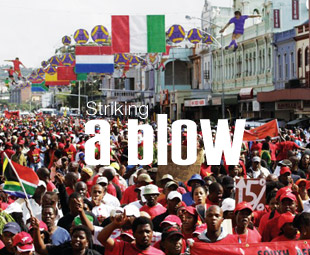Striking a blow

The strike by members of the SA Transport and Allied Workers’ Union (Satawu) and the United Transport and Allied Trade Union (Utatu) brought some sectors of industry to their knees. Now that it’s over, GERHARD HORN counts the cost.
Just take a moment and imagine South Africa as a fully functioning human body. Then assign each of the major cities the function of one of the various important organs of the body. Johannesburg/Pretoria/Cape Town would be the heart of our country; the most important organ keeping our economy, our body, in decent shape.
But these organs by themselves are of no use to us. They need to be connected to the rest of the body or they would just shrivel up and die. So we need some veins to pump blood around the system; to carry around the oxygen that keeps us going. If we extended this metaphor slightly, the veins transporting that oxygen would undoubtedly be the various transport systems we have in our beautiful country.
Unfortunately our body sustained a heart attack a few weeks ago. One of the major arteries clogged up and the events that followed were catastrophic. The effect that this clogged artery had on the body’s functioning is quite staggering.
The offender in question was state-owned Transnet. Thousands of its workers, unhappy with their wages, and no doubt sensing that with the World Cup looming they were more indispensable than ever, went on a nationwide strike that lasted for more than two weeks. They wanted a 16% annual increase, but Transnet was not budging on its initial offer of 11%. A standoff ensued which eventually led to a mutual agreement of 11%, the very same figure Transnet initially proposed. Utatu was the first to settle, followed by Satawu a week later. In the case of the latter, the clincher was a 1% ex gratia payment, payable to all bargaining sector employees on June 27. The members of the trade union smiled at the idea of this extra lolly; Transnet smiled at the fact that this payment would not impact on the base cost of wages. According to Transnet acting chief executive Chris Wells, the 11% increase will still cost Transnet R1 billion more in wages each year. Sounds routine enough when you look at it that way, but the real damage was done during the 17-day staring match.
Estimated costs ran into the billions, or roughly between R300 and R500 million daily, according to economist Mike Schussler, who spoke to the media during the final days of the strike. Business Unity South Africa (BUSA) estimated that, in total, the strike cost the country R7 billion.
Above and beyond the millions Transnet lost as the transport infrastructure ground to a halt, we have to add up the millions in GDP lost via the ripple effect. Other businesses were also severely affected. Thousands of employees were left stranded at stations without a means of getting to work.
Damage was also done to the economic well-being of striking employees. It was reported that the work force actually lost more money – they were not paid during the strike – than they could have made, had their demands been met.
More money can be added to the tab for the inevitable damage caused by disgruntled striking employees. Those not partaking in the strike were intimidated and Transnet equipment was vandalised. It was recently revealed by Wells that infrastructure and equipment to the tune of R60 million was damaged. Contractors were hard hit too; millions of rands in damage was caused to privately owned contract company equipment.
However, if you look at the results in the broadest sense, the above damages are merely a drop in the ocean. The real damages will only make themselves felt once the impact of big businesses’ loss of their traditional transport solutions is calculated. Just look at the list of sectors that rely on Transnet for transport solutions; mining, agriculture, manufacturing, the fuel industry and, of course, long-haul trucking companies (without containers being offloaded, some transport operators were left with nothing to truck).
Fortunately the fuel industry was not as hard hit as might have been expected. There was talk of our fuel supply drying up, but it didn’t reach that point. Some people, myself included, had some difficulty getting hold of 95 unleaded in small towns such as Potchefstroom, but the big cities never experienced this problem.
This is largely thanks to the fact that the South African Petroleum Industry Association (SAPIA) kept a close eye on the situation as it had been warned. In a press release it stated that the organisation had “engaged members on the strike and all have confirmed appropriate contingency plans against possible fuel supply disruptions”. For one, the fuel industry switched from rail to road transport. Had SAPIA not shown this foresight the effects would have been even more catastrophic.
Unfortunately not everybody could have planned ahead – and, in fairness, forward planning was sometimes simply impossible. One of the sectors hit hardest by the strike was agriculture. During the recent recession, this sector shed more than 100 000 jobs. The news had been better during the first part of 2010, when 30 000 jobs were reclaimed in this sector that has unfortunately shed thousands of jobs over the past decade. The strike has now impacted on that positive trajectory. The severe backlog of produce that needed to be transported became such a major problem that Tina Joemat-Pettersson, minister for The Department of Agriculture, Forestry and Fisheries, had to step in. The department released a press statement calling for a quick resolution to the strike, stating that the “prolonged strike action was negatively impacting on agriculture and adversely affecting our economic potential”.
The minister stated that the “estimated loss in the fruit industry alone would run into R1 billion and initial estimates by the citrus industry indicated that due to bunched marketing, a loss of approximately R650 million was anticipated”. In its media statement the ministry said the agricultural sector was entering the citrus and avocado season, but “the backlog of apples and pears in storage will impact on the future harvest of other fruit”.
In addition companies were forced to pay port congestion fines. According to the department the penalty for those in the agricultural sector alone amounted to R80 million.
Vehicle manufacturers were also hit hard. In the case of truck manufacturer, Nissan Diesel, more than three weeks worth of components were delayed. This meant that they had to produce vehicles for export at a reduced rate, while waiting for the delayed parts to finally arrive.
In his valiant attempts to limit the damage to the perceptions of international investors chief executive officer of Nissan Diesel SA, Johan Richards said, “We have already put numerous measures in place to ensure that we are ready when the delayed components do arrive. This includes a planned increase in the productivity rate of the plant, the addition of more temporary staff to the line, as well as running the plant overtime for an extended period.” The company believes that the situation will only normalise by September.
The strike could not have come at a worse time for truck manufacturers. The demand for trucks escalated as the World Cup approached. As Casper Kruger, vice president of Hino South Africa, confirms, “The improvements we have seen in the market have, predictably, been mainly driven by deliveries of vehicle types most likely to be involved in the World Cup.”
While the long-term impact is still unknown, May sales were almost certainly affected. “With the three-week Transnet strike barely over, and some services still not up to full speed, it remains difficult to estimate what influence this may have exerted on the May truck market result. Clearly, there would have been delays in clearing inbound shipments of vehicle components, which had the potential to further deplete the local assembly supply chain that was already under pressure to satisfy market demand,” says Kruger.
He believes that strike-related inertia in the handling of goods containers, particularly in Durban harbour, played havoc with the activities of line-haul transport operators contracted to forward urgently-required supplies of inbound commodities ordered ahead of the World Cup, resulting in temporarily under-utilised and non-productive fleets. “This definitely makes a good extra-heavy commercial vehicle segment result in May unlikely,” Kruger tells FOCUS.
MAN Truck & Bus is another company that was impacted negatively by the strike. Its plant could not source sufficient CKD kits, and this led to a closure of the Pinetown assembly plant for eight days. “We produce seven units a day and are therefore 56 units behind. This must now be caught up and the plant will have to work overtime. In short, it definitely cost us, but, how much, is difficult to quantify,” says chief financial officer of MAN, Maarten Roode.
John Jewiss, managing director of Alcoa, which supplies wheels to MAN’s assembly plant, sums the situation up perfectly: “We can try to make up for lost time but, at the end of the day, it is business lost.”
The same happened within the automotive industry. “The Transnet strike has no doubt impacted the entire industry to some extent,” says Jacques Brent, vice president of marketing, sales and service for the Ford Motor Company of Southern Africa.
Andrew Kirby, senior vice-president of marketing at Toyota SA, agrees: “The Transnet strike placed all manufacturers under strain, but Toyota took various steps at great cost to the company to keep the factory doors open, and to continue shipping vehicles abroad.”
Of course, with Transnet’s workers on strike, there was potentially some benefit to truck operators. “The biggest impact was on the transportation of fuel and fly ash in cement operations where customers were required to switch from rail to road,” says Abrie de Swardt, marketing director of Imperial Logistics.
But Imperial did not score. “We have not benefited significantly from the strike and we have not gained significant business as a result thereof,” De Swardt tells FOCUS.
Ultimately, it seems that no one really benefited, not the workers, not Transnet and certainly not the economy. “Supply chains were severely disrupted and in many cases export contracts have been permanently lost,” BUSA warned.
And the sad reality is that strike season is far from over. The new Bus Rapid Transport system employees are disgruntled at not being permanently employed. As this is being written, members of the National Union of Mineworkers (NUM) are due to start striking over wage disputes with De Beers.
We have already seen the implications of just one strike – albeit a significant one. Can South Africa survive another series of blows? Our metaphorical already weakened body may not recover from yet another heart attack.
Published by
Focus on Transport
focusmagsa



